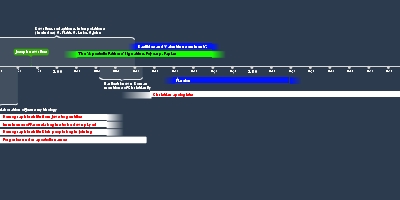Clement of Alexandria (jan 1, 182 – dec 31, 201)
Description:
Clement of Alexandria writes. Among his extant works we find an exhortation to pagans to abandon their gods (variously described as invented, demonic, or deified humans), extremely detailed guidance on how a Christian should conduct their life and habits, and a veiled exploration of a unique form of Christian theology, one informed by a syncretic blend of Middle Platonist, gnostic, and esoteric traditions, as well as an incredibly high Christology. Clement’s overriding concern is that of divine knowledge, which is given a position over and above simple faith. Those who are perfected in this knowledge (the “Gnostic”) secure superior rewards in the afterlife. Clement was hugely influenced and impressed by Greek philosophy, and sought to preserve what was virtuous in it while ascribing such content to the antecedent influence of the Jewish scriptures and/or the Logos. He considered a number of noncanonical sources to be authoritative (Epistle of Barnabas, 1 Clement, Preaching of Peter, books of Maccabees, the “Traditions” by Matthew, Shepherd of Hermas, Assumption of Moses, Book of Enoch). He was also familiar with apologetic works of his time (Tatian’s Address to the Greek and Cassian’s Exegesis), and appears to have personally met with a number of frustratingly unnamed thinkers, including a foremost “Sicilian bee” in Egypt whom Eusebius would later identify as Pantaenus. Clement provides a huge number of unique (and/or completely heterodox) traditions related to theology, eschatology, and church history (see Sections B and D), and he is not above allegorizing or shoehorn-reinterpreting difficult or clearly legendary portions of scripture in order to make it fit his overall theological program.Clement disputes with other Christian sects in his writing, both in general terms and also targeting specific groups.
> Clement provides an entirely novel and self-refuting timeline of heterodox Christianity, claiming that Marcion lived before Simon Magus, yet paradoxically asserting that heresies only came into being during the time of Emperor Hadrian (117-138 CE). This timeline also preserves the claims of apostolic succession given by major gnostic leaders (Basilides -> Matthew/Glaucias [interpreter of Peter]; Valentinus -> Theudas -> Paul). Clement mentions several sects that appear to have no attested record up to this point and little-to-no record afterwards: the Peratici, the Harmatites, the Entychites, the followers of Prodicus, the Antitactae.
> Clement disparages various gnostic dogmas, such as the inherent corruption of creation, the existence of a Demiurge vs. a highest God, the concept of election, and various sectarian ethics around marriage and sex. In all this, he tracks firmly with the proto-orthodox. However, the details of Clement’s own theology are at times shocking close to that of his gnostic opponents. He claims that Scripture contains veiled truths only intended for a “worthy” or “elect of the elect” subset of Christians, who are “seeds” from God above; he hints at an unwritten tradition of gnosis handed down from the apostles; he centers all of this divine knowledge, claiming that by mastering it, a Christian becomes “perfected” and in essence a god on Earth, while also obtaining a better afterlife than those who merely operate on faith; he freely uses various gnostic buzzwords (“Monad”; “luminous cloud”; “middle place”), or alludes to gnostic theological concepts (pre-existence of souls; end-of-life ascension through various “spiritual essences” to reach “the highest thrones”); and his preferred term for the perfectly actualized Christian is actually just…”Gnostic”! Clement’s theology therefore appears to be some sort of hybrid between proto-orthodox and gnostic traditions of early Christianity. He also provides us with a variety of opinions and quotations from previous gnostic luminaries (Valentinus, Basilides, and Marcion) in a much less polemical way than earlier sources, even occasionally quoting them in agreement.
> Similar to his treatment of gnosticism, Clement explicitly refutes Docetism, but in doing so he ends up propounding a version of Jesus’ body that is remarkably close to docetic in nature.
> Clement casts aspersions on the truth of Montanist prophecy, and testifies to their use of the disparaging term “natural men” for proto-orthodox believers.
> Clement pushes back against Encratism on the subjects of wine, marriage, and procreation. He ascribes various of their doctrines to Tatian and Julius Cassianus.
> In attempting to rehab the reputation of Nicolaus, Clement provides possible information on the long-attested but little-described Nicolaitans, and other sects that supposedly privilege indulgence of the passions.
Even in his own time, Clement found himself embattled with his own proto-orthodox compatriots over his obvious admiration for Greek philosophy and sciences (which were despised by most of his sect). And in the centuries to come, several of Clement’s views (or views ascribed to him by later writers) came to be branded as quite heterodox, including:
> Universalist doctrine (even those who go to hell have the opportunity to repent and be saved)
> A bizarre eschatological system, in which hierarchies of angelic powers and human souls undergo continual promotion into ever-more divine beings
> Matter, thought, and cosmic cycles predating the creation of the world
> God being neither male nor female; having female features and qualities at certain times
> Christ as the Logos being created at some point
> Angels able to have sex with human women
> Possible belief in reincarnation
Added to timeline:
Date:
jan 1, 182
dec 31, 201
~ 20 years
